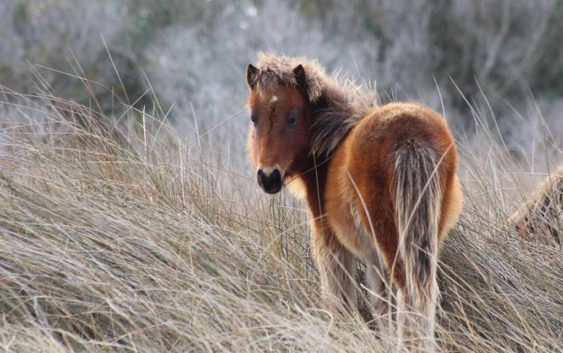- California wildfire burns out of control but firefighters could get a break when winds diminish
- 'Flooding is our number one natural disaster' | Breaking down the voter-approved Harris County Flood Control District tax rate hike
- Powerful Category 3 Hurricane Rafael knocks out power in Cuba as it heads to the island
- NC Forest Service warns of increased wildfire risk in western part of state after Helene
- First responders searched for hours after being told two people were swept away in flash flood
Some of NC’s wild horses weathered Florence fine. Others still aren’t accounted for yet.

At least three of North Carolina’s wild horse herds are safe and accounted for, according to the organizations that oversee and care for them.
But at least one herd, living on a barrier island hit hard by Florence and still inaccessible days after the storm passed, are unaccounted for. Staff are working hard to reach them.
While the Corolla, Rachel Carson Reserve and Cedar Island herds weathered Florence fine and are getting back to normal, the condition of the Shackleford Banks herd is still uncertain, according to Margaret Poindexter, chairwoman and president of the nonprofit Foundation for Shackleford Horses Inc.
“Please know that we and the park staff are as anxious as anyone to put our eyes on horses and count noses. Since the passage of the Shackleford Banks Wild Horses Protection Act 20 years ago, the Foundation and the Park have worked cooperatively to preserve and protect the wild herd on Shackleford, including through hurricanes like Floyd, Isabel, and Irene,” Poindexter said on Facebook. “We are handling this storm no differently.”
Poindexter wrote on Facebook that an assessment of the herd “is impossible to conduct.”
“Unlike other herds which are located in places which make assessment relatively easy, the Shackleford herd is located on an uninhabited barrier island within a National Seashore only accessible by boat,” she said.
And while much of the news of Florence has focused on devastation in Wilmington and New Bern, Poindexter said on Facebook that Carteret County — including the horses’ home on Shackleford Banks — was hit hard.
“Cape Lookout, adjacent to Shackleford Banks, took an unofficial landfall, and bore the brunt of the strongest winds for hours upon hours. Harkers Island, where the headquarters of Cape Lookout National Seashore is located, suffered significant damage, and remains without power,” Poindexter wrote on Facebook. “The park remains closed to the public.”
“Things are still very dire and fragile here. Some people are still without power, homes and businesses are destroyed. We are doing what we can do,” Poindexter told The News & Observer Sunday.
A “skeleton crew” is working at the park to assess damage, but Poindexter said it would be “some time” before normal operations resumed.
“They have employees that have not even made it to their homes, and some that have found extensive damage and flooding,” she said.
“Equipment necessary to survey horses on Shackleford was moved out in advance of the storm and will not be available for several days.”
About 30 horses have been spotted so far, Poindexter said, “and all appeared to be healthy and acting normally.” But a formal survey of the entire herd isn’t possible yet. There are 118 horses in the Shackleford herd, Poindexter told the N&O.
As of Saturday, the park remained closed, with damage to docks and buildings, according to the Cape Lookout National Seashore.
“Also still to be done is the check on the Shackleford Banks horses … Shackleford Banks are not currently accessible to survey sea turtle nests or horses, however staff are developing plans to get to the island as soon as safely possible,” according the National Seashore.
A reopening date for the park — or a date when staff may be able to do a full check on the horses — had not been determined as of Saturday.
Staff is planning trips to the island this week and hopes to “have additional info soon,” Poindexter told the N&O.
The other horse herds, such as the Corolla herd, were relatively easier to account for, since their areas were not totally inaccessible and in some cases people live in the same area as the horses and were able to send staff updates.
“They are survivors,” Corolla herd manager Meg Puckett told The News & Observer on Sept 14, shortly after the storm swept over Corolla.
The Rachel Carson Reserve posted on Facebook Sept. 18 that “all of the Rachel Carson Reserve wild horses have been accounted for. All animals are in good condition.”
A privately managed wild herd on Cedar Island also was accounted for as of Saturday, Poindexter said.
Puckett also wrote on Facebook ahead of what was then a powerful Category 4 Hurricane Florence, that the wild horses would do just fine without help from humans — as they have for centuries.
“The horses have lived on this barrier island for 500 years, and they are well equipped to deal with rough weather,” Puckett said of the Corolla herd. “They know where to go to stay high and dry and are probably in better shape right now than most of us humans who are scrambling with final preparations.“
To contribute to the care and management of the Shackleford herd, send donations to the Foundation for Shackleford Horses Inc., 306 Golden Farm Road, Beaufort, NC 28516.